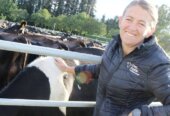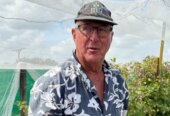New Zealand’s disability sector is about to be overhauled and Enrich Group chief executive Karen Scott says she is cautiously optimistic for the change.

Karen Scott
“There is a lot of choice taken away in the current system. We hope that with a systems transformation, it can give people the opportunity to choose what their good life looks like,” she said
On July 1 the government will introduce its new Ministry for Disabled People. The ministry was announced late last year and will overhaul how New Zealand’s disability sector operates.
Enrich Plus is one of the largest disability providers in Waipā. The Te Awamutu-based charitable trust, founded in 1990 as Graceland Charitable Trust and renamed Enrich Plus in 2013, works under the tagline ‘a life like any other’ and assists people with disabilities and neurodivergences in the Waikato, King Country and Bay of Plenty.

At a recent Enrich Plus client celebration in Hamilton, l-r Colin Long, Jasmin Khan (staff), Tracey McRoberts, Joshua Buchanan.
New Zealand disability providers like Enrich must seek funding from three separate agencies: the Ministry of Health (MOH), Ministry of Social Development (MSD), and the Accident Compensation Corporation (ACC).
The Ministry for Disabled People hopes to streamline how this funding is allocated, and how information is shared.
“By having one ministry, hopefully we get rid of some of that siloed, different eligibility criteria.”
The current system’s separate criteria for funding means that somebody with a physical disability and a co-morbid mental health condition – such as an amputee who has depression – may be eligible to get funding for prosthetics but won’t necessarily be eligible to receive funding for counselling.
“This is the problem in the disability sector, which is why we are looking forward to change.
“At the moment it is kind of like a deficit model, you’ll go for a needs assessment, and they’ll ask you what you can’t do, not what you want to do and how you think you can achieve it. Your funding is based on that.”

Pictured at a recent celebration luncheon were from left, Enrich Group chief executive Karen Scott, Shannon Clark, board member Maree Haddon, Caleb Wickenden, and service manager Shelley Blair.
The new ministry will incorporate the Enabling Good Lives (EGL) approach, which views people in their entirety, instead of their separate conditions. Enrich already incorporates the EGL values into their services but are limited by the current funding system.
“We hope that whatever someone needs to live a good life, they will get the right budget to support that. I think we have got to stop looking at ‘what is your disability and what can’t you do’ to get your funding. What we are passionate about is the whole person.”
The government did not address minimum wage exemption permits in their announcement of the new ministry. The permits allow for employers to pay employees less than the minimum wage, if they have a disability and a labour inspector deems it reasonable and appropriate to do so.
Scott says Enrich’s employment team never makes use of these exemptions and wishes the permits would be reviewed.
“I’m fully against having a minimum wage for disabled people… It is a fine line, because historically that is how some of the social enterprise services have been able to operate. And yes, it does give someone with a disability a job, but is it giving them a job where they’re able to input back into society and live a life like any other? I wouldn’t imagine so.”
With the upcoming changes and the peak of Covid-19 now steadily in a decline, Scott is also cautiously optimistic for the future of her sector.
“We have now got pretty much full capacity with everyone back, which is the first time in over two years that we have been able to say that.
“The optimism that I have for the future is that anybody that wants to access our service, gets the choice of who they do that with, and how they can achieve it.
“I hate to say I am a cynic, I started working for the disability sector when I was 17. I suppose I am really passionate about the changes; it has just taken a very long time to happen. So, I hope it happens. If it does, it will be a brilliant opportunity for people to choose what a good life looks for them.”










